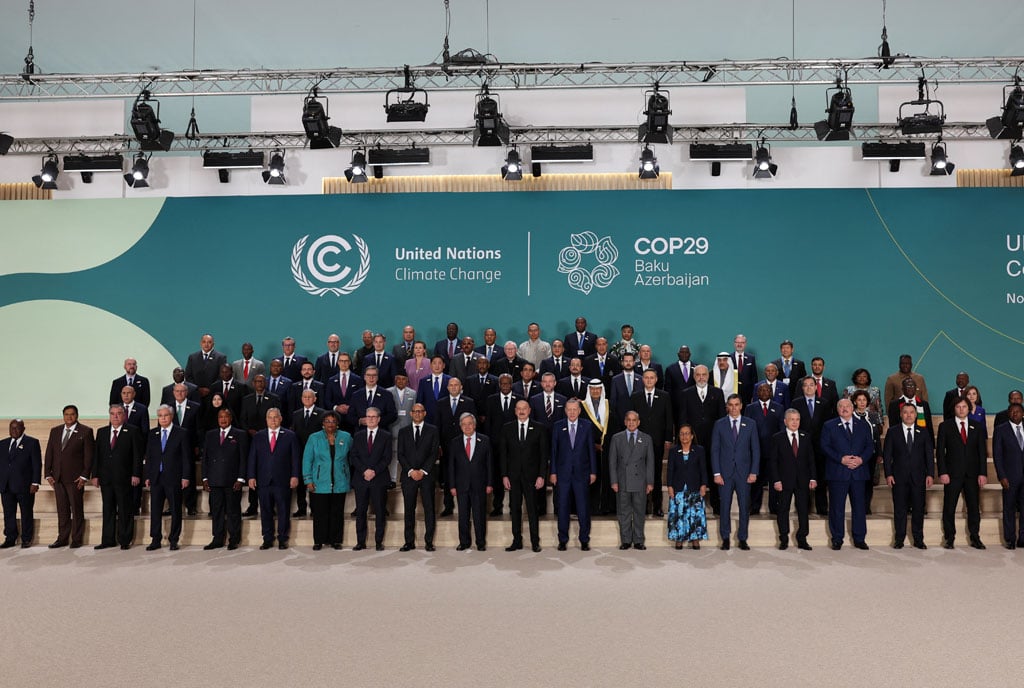COP29 must remedy injustice of climate finance in Africa

World leaders attending the United Nations climate change conference, known as COP29, pose for a family photo in Baku, Azerbaijan November 12, 2024. PHOTO/REUTERS
What you need to know:
- In theory, it is meant to allow African nations to sell carbon credits generated by forest preservation or emission reductions to developed countries or companies looking to offset their emissions. But the reality is far more complex.
African countries continue to face a dilemma that goes beyond just climate financing. This dilemma, a reflection of global climate inequalities, highlights the lack of financial choices available to African countries. Traditional funding models are becoming obsolete, caught in the intersection of climate and development imperatives.
Yet the legacy of separate funding perpetuates a fragmented approach that fails to allocate resources according to real needs. Unlike more prosperous regions, African countries have never benefitted from robust capital markets capable of supporting large-scale, long-term investments. Instead, they have relied on external borrowing at prohibitive rates, concessional financing and development aid.
In the context of climate financing, this dependency has only deepened inequalities. Africa, which accounts for less than 4 percent of global greenhouse gas emissions, bears a disproportionate burden of climate impacts while struggling to access the liquidity needed to meet both its development goals and climate ambitions.
International financial institutions such as the IMF and World Bank have proposed reforms, but these are far too timid and do not address the root of the problem. The discourse surrounding the “leverage” of private financing and hybrid financing – where public funds are used to attract private investments – is presented as a miracle solution for developing countries, but this model is fundamentally flawed. It creates the illusion that adequate funds are available while merely redistributing existing resources. In doing so, it forces African governments to absorb investment risks without actually generating new liquidity.
These financing methods compel African countries to choose projects that appeal to private investors, at the expense of those truly necessary for structural transformation. The carbon market is touted as a solution for African countries.
In theory, it is meant to allow African nations to sell carbon credits generated by forest preservation or emission reductions to developed countries or companies looking to offset their emissions. But the reality is far more complex. These markets remain fragmented, lack transparency and are dominated by interests that do not serve Africa’s development. The rules, certification processes and standards of these markets are dictated by developed countries, leaving African nations little control over the value of their credits.
Africa is also encouraged to raise its ambitions within the framework of its nationally determined contributions under the Paris Agreement, with the implicit promise that these efforts can be monetised through carbon credit sales. The reality is that Africa’s vast natural gas reserves could play a crucial role in funding its transition to clean energy.
But African countries are discouraged from exploiting these resources on the grounds that it would increase their carbon footprint, even as developed countries continue to exploit their own without restraint. This double standard clearly illustrates the injustices that characterise the global architecture of climate financing.
The solution lies in creating a financial architecture that recognises the interdependence of development and climate, giving African countries access to the liquidity needed to drive their own transformation. It is about moving beyond false divides to embrace a holistic approach that tackles the root causes of limited political choices in Africa.
Carlos Lopes, professor at the Mandela School of Public Governance at the University of Cape Town


